LED light bulbs have become famous for consumers and businesses due to their energy efficiency, long lifespan, and environmentally friendly properties. However, as with any product, LEDs eventually need to be replaced, leaving consumers questioning how to dispose of them properly. The disposal of LED light bulbs is crucial for the environment and our health, as these bulbs might contain specific components that can be harmful if not appropriately addressed.
Several methods are available for disposing of LED light bulbs in a responsible manner to ensure minimal impact on the environment and our health. Recycling centers and local retailers often provide drop-off locations for these bulbs, ensuring they are processed correctly and safely.
It is crucial to check local regulations and available facilities for proper disposal, as simply throwing LED bulbs in the trash or mixing them with other recyclable materials can contaminate them and result in more waste being sent to landfills.
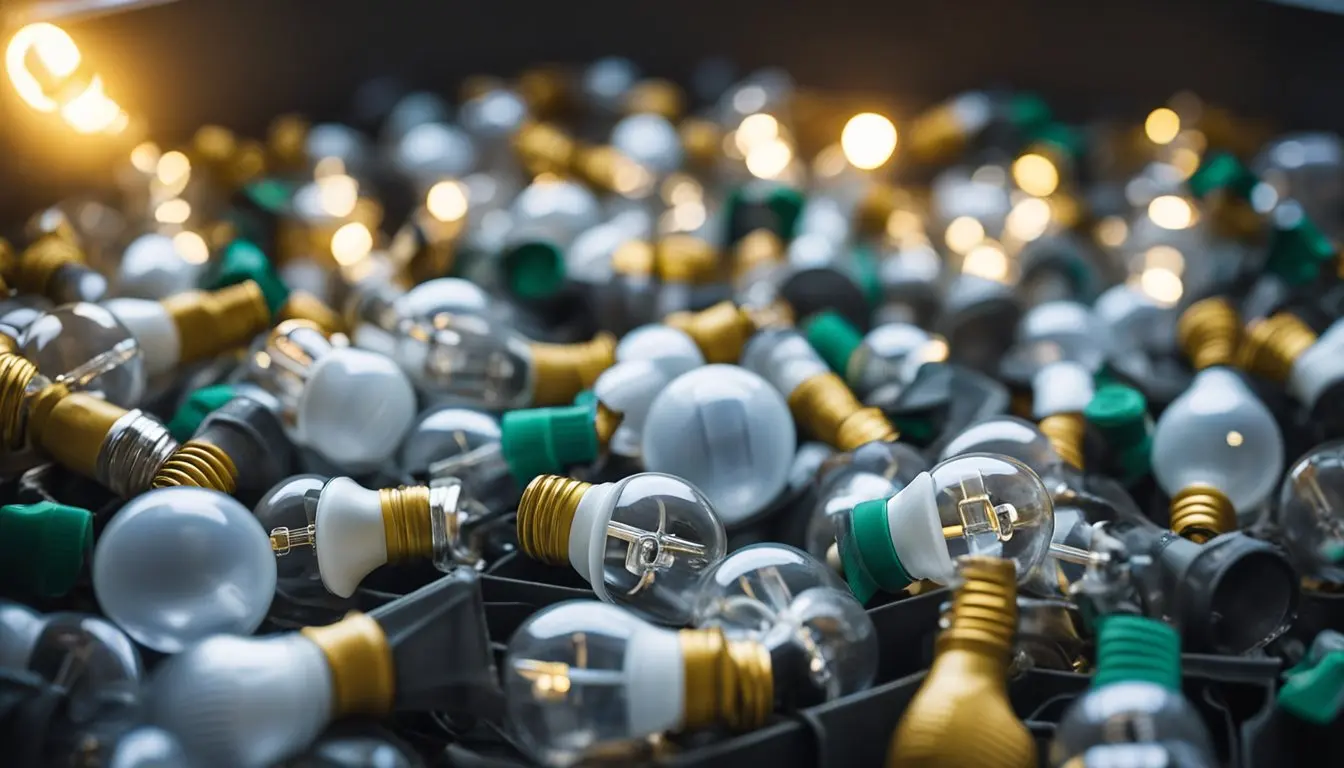
By taking the time to properly dispose of LED light bulbs, individuals can contribute to a healthier and more sustainable future. By understanding the importance of proper disposal and following local guidelines, we can minimize our environmental impact and preserve the benefits of LED technology for generations to come.
LED (Light Emitting Diodes) light bulbs are famous for their energy efficiency and longer lifespan compared to traditional incandescent and CFL bulbs. They have been considered a more environmentally friendly alternative but pose some disposal challenges. It is essential to understand these concerns and learn how to properly dispose of LED bulbs to minimize their environmental impact.
Unlike CFLs, LED bulbs do not contain mercury, a toxic substance found in many fluorescent bulbs. However, some LED bulbs might have traces of other hazardous substances in their components, like arsenic and lead. These substances can harm humans and the environment if not disposed of properly.
The disposal of LED light bulbs can be a challenge for several reasons. Firstly, not all recycling facilities accept LED bulbs due to their complex components and specific recycling methods required.
This means that proper disposal options might be limited for some individuals. Additionally, improper handling and disposal of LED bulbs can lead to the leakage of toxic elements into the environment.
To responsibly dispose of LED bulbs, you should:
In conclusion, while LED light bulbs are a more energy-efficient and environmentally friendly lighting choice, they still require proper disposal to minimize any potential harm. By following the appropriate steps and understanding the challenges of LED bulb disposal, you can contribute to a cleaner and safer environment.
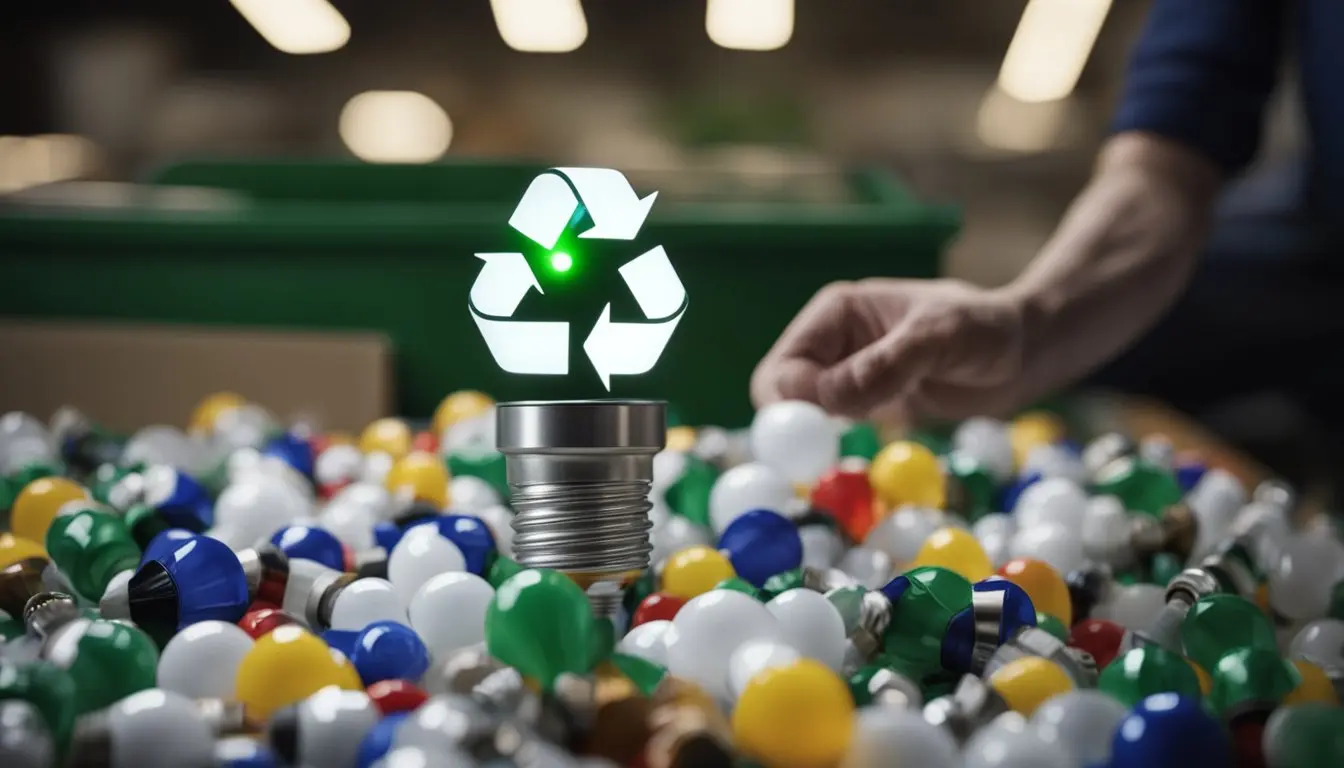
Prepare LED Bulbs for Disposal
Before disposing of LED bulbs, it’s essential to prepare them properly to ensure safety for you and waste collectors. Although LED bulbs don’t contain hazardous materials like mercury, they can still break and cause injury. To minimize the risk, follow these steps:
Taking these precautions will make the disposal process safer and more efficient.
Once the LED bulbs are correctly prepared, the next step is to find a local recycling center or disposal method. Here are some options to explore:
With adequate preparation and proper disposal methods, you can contribute to a more sustainable environment by disposing of LED bulbs responsibly.
When looking to dispose of LED light bulbs, it’s essential to understand the various options available. Recycling and drop-off locations provide environmentally friendly alternatives to simply throwing bulbs in the trash.
Many retailers offer take-back programs for LED light bulbs, which enable customers to return used bulbs to the store for proper disposal. Retailers that participate in such programs include.
These companies partner with responsible waste management services to ensure bulbs are recycled safely and correctly. If you have an IKEA or Home Depot store nearby, you can check with customer service or their websites for more information on their specific recycling programs.
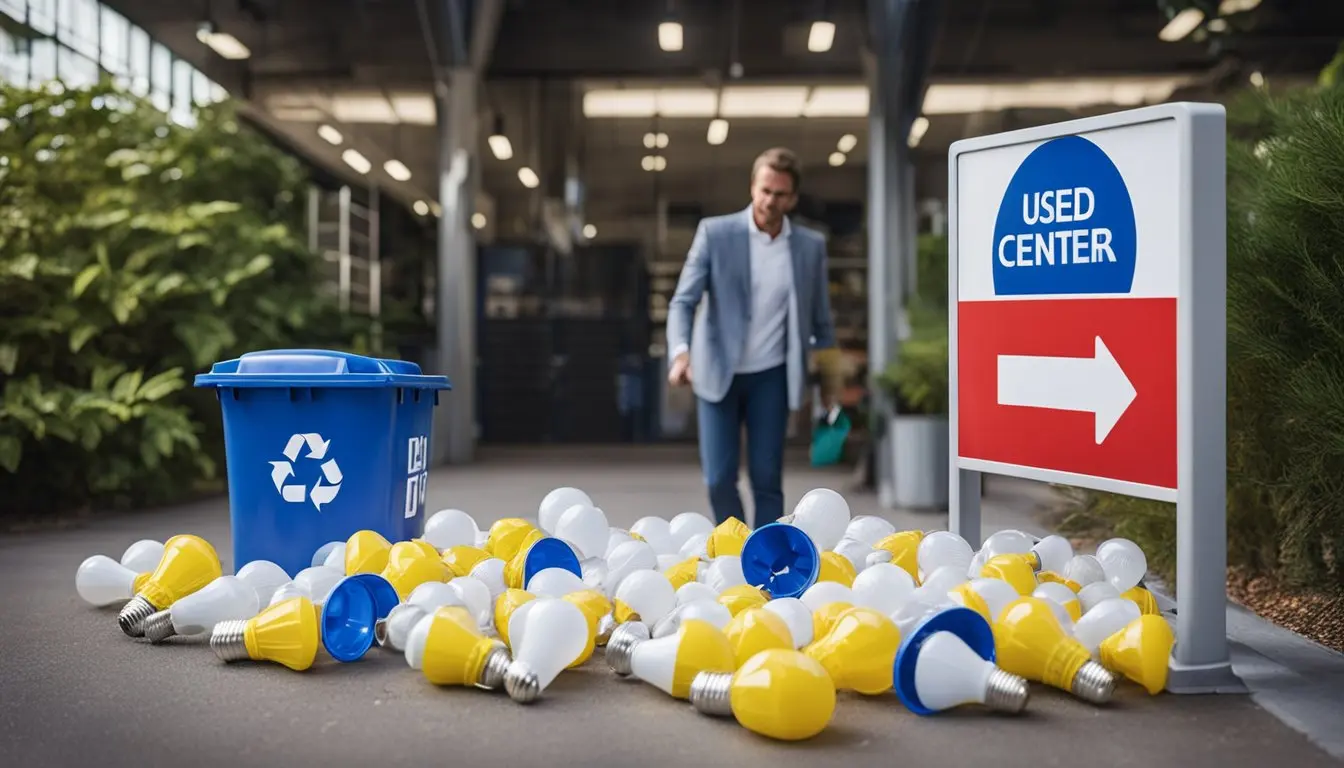
There are also specialized recycling services that focus on the proper disposal of LED light bulbs. Earth911 and Batteries Plus are two examples of such services. Earth911 offers a search tool on its website, allowing users to find nearby recycling centers for LED bulbs by entering their zip code. On the other hand, Batteries Plus accepts LED bulbs at their locations for a small fee to ensure safe and responsible disposal.
In summary, when disposing of LED light bulbs, consider the options available, including retailer take-back programs and specialized recycling services. This helps ensure the bulbs are handled responsibly, reducing their negative environmental and human health impacts.
One of the primary reasons LED bulbs are popular is their energy-efficient nature and long lifespan. However, once they eventually reach the end of their life, it’s crucial to consider alternative options for disposal that prioritize sustainability and environmental conservation.
Upcycling is a creative way to extend the use of LED bulbs beyond their original intended purpose. While LEDs may no longer provide adequate light, they can be repurposed into various decorative and practical items.
Before repurposing, ensure the LED bulb is unplugged and cool to touch. Safety should always be a priority when handling any electronic or glass materials.
Here are some upcycling ideas for LED bulbs:
Considering the rare earth minerals found in LEDs are finite, recycling them ensures that these valuable materials can be reused to make new light bulbs. Some hardware stores and big-box retailers, such as Home Depot, Lowe’s, and IKEA, provide collection bins for LED light bulbs. However, it’s always a good idea to call these stores before your visit to confirm their recycling policies.
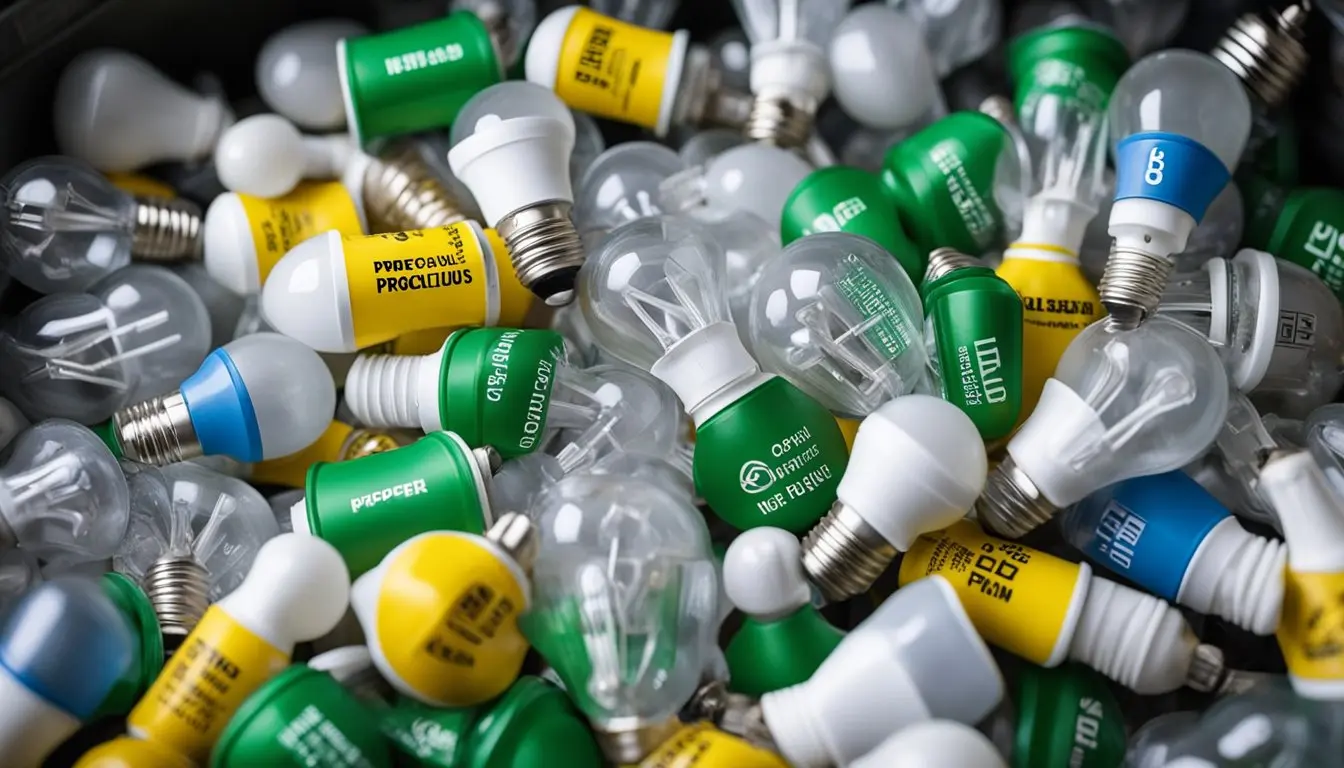
When disposing of LED bulbs, it is essential to consider their potential impact on the environment and human health. Since these bulbs contain hazardous substances, it is crucial to follow appropriate disposal methods rather than throwing them in the regular trash.
Contact your local municipality to inquire about LED light bulb recycling options. Some cities may have designated drop-off locations or curbside pick-up services during specific dates. If your local municipality does not provide LED recycling services, utilize online search tools like Earth911 to find the nearest recycling center or hazardous waste facility.
Contact your local municipality to inquire about LED light bulb recycling options. Some cities may have designated drop-off locations or curbside pick-up services during specific dates. If your local municipality does not provide LED recycling services, utilize online search tools like Earth911 to find the nearest recycling center or hazardous waste facility.
To make the disposal process more accessible and safer, here are some final recommendations:
By adhering to these suggestions, you can ensure your LED bulbs are disposed of in an environmentally responsible manner. This not only helps reduce landfill waste but also contributes to the protection of the environment and our communities.
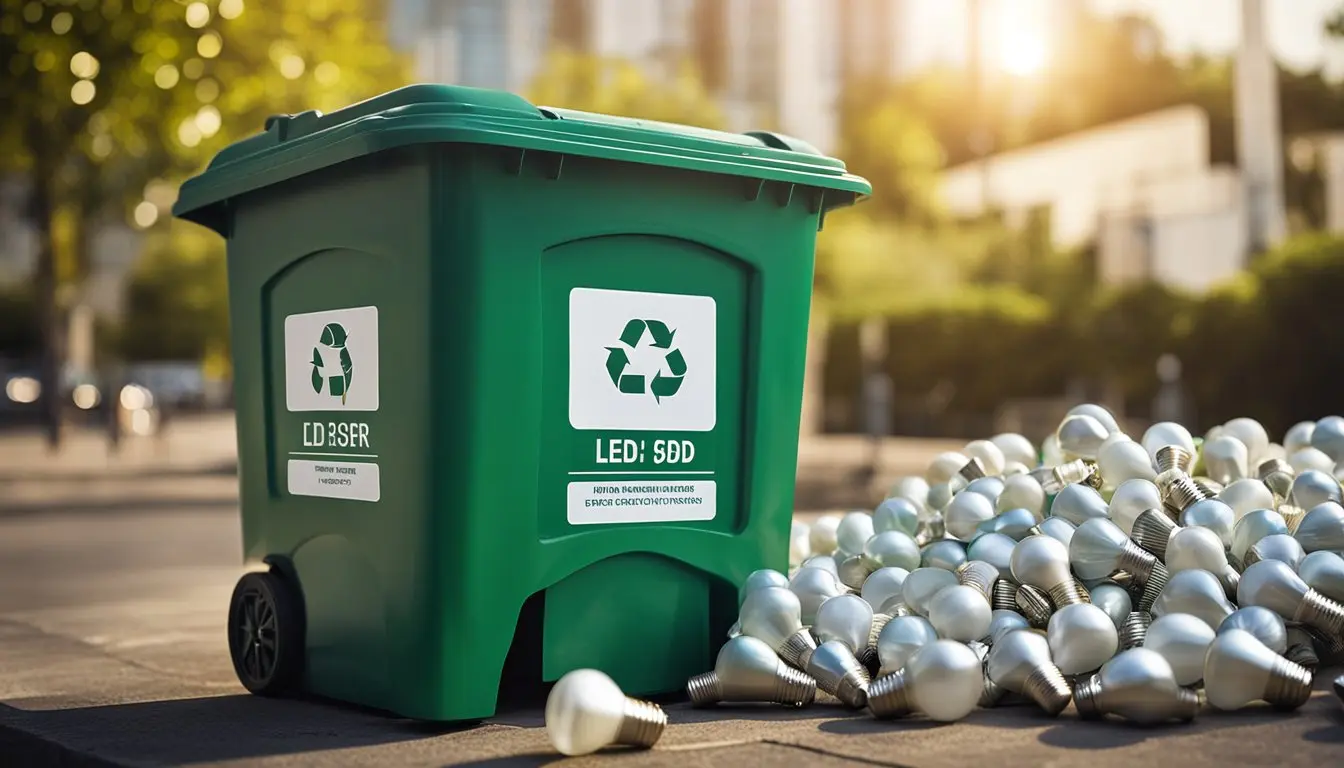
To recycle LED light bulbs, it is recommended to take them to a local recycling facility that accepts them. Many recycling centers have special programs for disposing of electronics and light bulbs. Ensure proper handling of the bulbs to prevent any potential health risks associated with improper disposal.
Although permissible under some circumstances, it is not the most environmentally responsible option. Recycling LED light bulbs and other household recycling items is preferable, as they may pose certain health risks if not handled correctly.
You can typically take LED light bulbs to a local recycling center or waste disposal facility. Many recycling centers have dedicated programs for disposing of electronics and light bulbs. Watch for recycling events organized by your local government or environmental agencies.
Yes, broken LED light bulbs should be handled carefully to prevent injury. It is advised to wear gloves to protect your hands from sharp edges and to collect the fragments in a sealable plastic bag or container. For safe disposal, broken bulbs should be taken to a proper recycling facility.
State-specific guidelines may apply to the disposal of LED light bulbs. Always consult your local government’s waste disposal guidelines for up-to-date information on proper disposal procedures in your area.
State-specific guidelines may apply to the disposal of LED light bulbs. Always consult your local government’s waste disposal guidelines for up-to-date information on proper disposal procedures in your area.